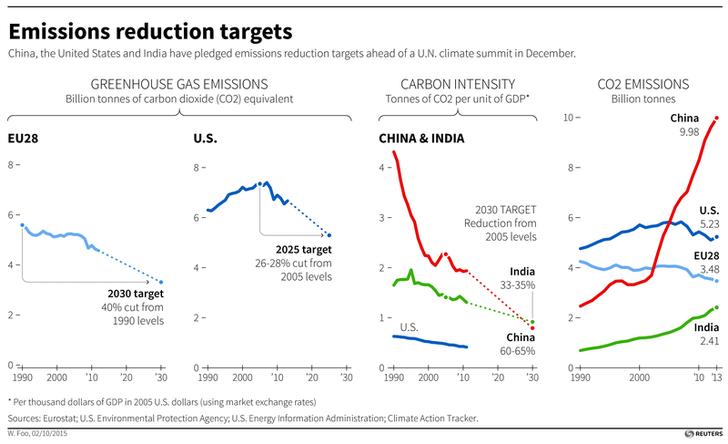Can a climate deal be reached in Paris?
Stay up to date:
Future of the Environment
As the world turns its attention towards the Paris climate change negotiations in the next two weeks, much has already been said on the following questions. Will there be a global agreement? Will the agreement be sufficiently robust against the 2° Celsius target? Will it fall apart like the Copenhagen conference did six years ago?
On the prospect for a global agreement, the general outlook is yes, probably – though more voices of caution have emerged in recent weeks. Some of the challenging questions that have bedevilled climate negotiations from the outset remain – how to balance future responsibilities against past ills, or whether developed countries are seen to be delivering enough climate finance or emissions mitigation.
How does the outlook ahead of Paris compare against expectations before Copenhagen? Is the level of optimism justified? There are three main differences. First, developments in the real world have made a difference, particularly the sliding costs and quickened pace of renewable energy deployment.
In 2014, renewables made up over half of total energy investment. Meanwhile, the cost of solar panels has fallen by 75% while that of batteries for electric vehicles has fallen by half since 2009, for example. Wind-generated electricity in over 50 countries is now at grid parity – when the customer of electricity pays the same to buy wind energy as traditional technologies. While there are ongoing disagreements over the likelihood of swiftly replacing current energy stocks with renewables at scale, the fact that there are cost-competitive low carbon alternatives is key.
On the negotiation front, while 156 pledges have been submitted from 183 countries, covering over 95% of total global emissions, it has long been evident that they will not suffice to keep the world within the 2°C limit. The promised measures include the United States pledge that emissions in 2025 will be 26-28% below 2005 levels, and China’s pledge to peak emissions by 2030 while increasing its share of non-fossil fuels in primary energy consumption to 20%.
Even optimistic estimates suggest that all of the pledges taken together would only contain warming to 2.7°C above pre-industrial levels. But these bottom-up pledges provide an important foundation from which countries can ratchet up before 2020. This is why emphasis is now placed on the five-year review mechanism, the long term goal as well as transparency.
Last but not least, compared to the late 2000s, the business sector today better understands how deepened globalisation has heightened vulnerabilities through global supply chain shocks. These disruptions could be further triggered by climate volatility and policy uncertainty.
Evidence abounds. CEOs from 78 large companies based in Brazil, China, India, Indonesia, Singapore, Japan, Russia as well as the US and European countries offered their support for a comprehensive global climate agreement through an open letter to the world’s governments. The United Nations also recorded over 10,500 commitments by non-state actors – such as businesses and cities – in their portal. And they are not alone.
Comparing the period 2007-09 in the run-up to COP15 in Copenhagen to the period 2013-15 in the run up to COP21 in Paris, the number of business statements on climate action (and the number of companies expressing their support for these statements) has grown by about 50% – amounting to more than 3371 companies in the run up to COP21. This means that nearly a quarter of Forbes 2000 companies have signed up to public statements on climate action – this is not an insignificant number.
Figure 1 – Number of Signatories to Statements on Climate Action
Source: World Economic Forum
For Paris to be meaningful, it must become a pivot that would kick-start the next generation of sustainable growth, poverty reduction and public-private cooperation – through catalysing private finance, scaling low-carbon, climate-resilient investment, and unleashing the next generation of appropriate or advanced technologies, especially but not only in developing countries. This once-in-a-generation opening could be missed, however, if governments continue to value short-term competitiveness concerns above the prospect of longer term global prosperity and environmental security.
That some of the world’s largest companies in key sectors are willing to make significant commitments is not only positive. It also provides a critical strategic opening for the international community to begin further work post-Paris to trigger a new phase of global collaboration on climate action. Much more than in countries’ submitted pledges, this is where the potential of a Paris climate agreement lies.
The hope is that coalitions of committed governments, businesses and civil society could together send a strong set of clear signals to the wider business community that the world’s governments are willing to tackle climate risks in an ambitious manner. In the absence of such signals, the more vulnerable populations will be consigned to the negative spiral of poverty and environmental degradation. Paris is not an opportunity the world can afford to miss.
Author: Bernice Lee, Head of Climate Change and Resource Security Initiatives, World Economic Forum
Image: A participant is pictured in front of the entrance at the venue for the World Climate Change Conference 2015 (COP21) at Le Bourget, near Paris, France, November 29, 2015. REUTERS/Stephane Mahe
Don't miss any update on this topic
Create a free account and access your personalized content collection with our latest publications and analyses.
License and Republishing
World Economic Forum articles may be republished in accordance with the Creative Commons Attribution-NonCommercial-NoDerivatives 4.0 International Public License, and in accordance with our Terms of Use.
The views expressed in this article are those of the author alone and not the World Economic Forum.
Related topics:
Forum Stories newsletter
Bringing you weekly curated insights and analysis on the global issues that matter.
More on Climate ActionSee all
Fred Krupp
July 15, 2025
David Elliott
July 15, 2025
Anurit Kanti
July 15, 2025
Sebastian Buckup and Beth Bovis
July 10, 2025
Majlinda Bregu
July 9, 2025








